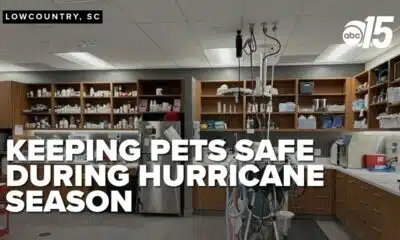News from the South - Louisiana News Feed
A Community Mourns: Remembering Nikyra Dedeaux, a shining light lost too soon
SUMMARY: Eighteen-year-old Nikira Doo, affectionately called “Biscuit,” was mourned by friends and family today following her tragic death in a terrorist attack on Bourbon Street. A recent honor graduate of Harrison Central High, she had dreams of becoming a registered nurse and was celebrating New Year’s Day with loved ones when an attacker drove into the crowd. Attendees wore pink, her favorite color, and her casket was adorned with bright florals. Many at the funeral witnessed the horrific incident. Counseling is aiding some survivors’ emotional recovery, while a friend has created a GoFundMe for therapy support.
Hundreds gather in Gulfport to honor the life of Nikyra Dedeaux, a recent graduate with dreams of becoming a nurse, tragically taken in a New Year’s Day attack.
News from the South - Louisiana News Feed
Louisiana 2-year-old battling leukemia in need of blood, platelet donations
SUMMARY: Two-year-old Hezekiah “Hezzy” Martinez, diagnosed with Acute Myeloid Leukemia, recently left Children’s Hospital after nearly a year, now cancer-free with a clear bone marrow. His mother, Lidia Martinez, donated bone marrow in Kansas City, which saved his life. Although Hezzy is home, active, and smiling, his recovery continues, requiring ongoing blood and platelet donations. Blood center representative Paul Adams emphasizes the constant need for donors, as platelets have a short shelf life and donations support multiple patients. The family is grateful for the community’s prayers and support. Blood donations can be made at the Metairie Blood Center, 2617 Edenborn Ave.
The post Louisiana 2-year-old battling leukemia in need of blood, platelet donations appeared first on wgno.com
News from the South - Louisiana News Feed
More states try, and fail, to pass Louisiana-style abortion pill restrictions
by Sofia Resnick, Louisiana Illuminator
July 12, 2025
Though many legislative sessions have concluded for the year, states could soon see more changes to reproductive health care access with new federal legislation that might lead to clinic closures, as well as pending health policies on abortion pills.
Reduced access to abortion and reproductive health care are expected following the reconciliation budget bill President Donald Trump signed on July 4. It strips Medicaid funds from certain reproductive health care providers that also offer legal abortions, especially affecting Planned Parenthood.
The largest nonprofit network of reproductive health clinics says an estimated 1 million Medicaid patients would likely lose access to services like birth control, cancer screenings and STI testing, and that it could end up closing 200 of its 600 clinics around the country, primarily in rural areas and in states where abortion is legal.
Planned Parenthood sued the Trump administration, and a federal judge temporarily blocked the provision. Though the administration on Friday argued the temporary restraining order should not have been allowed and asked the judge to reverse course.
Federal changes to medication abortion rules could also be coming soon, depending on how multiple lawsuits play out. This week one of those lawsuits, Washington v. U.S. Food and Drug Administration, ended in a loss in federal district court for the mostly Democratic-led states that sued to eliminate prescriber certification requirements they argue are burdensome.
Just halfway through its first year in power, the Trump administration has already fulfilled many requests from national anti-abortion groups. These groups are urging the U.S. Department of Health and Human Services to add new requirements for medication abortion after Secretary Robert F. Kennedy Jr. said he would review abortion opponents’ claims, based on unpublished papers, that abortion-inducing drugs are unsafe.
With federal policy changes poised to reshape the reproductive health care access landscape once again, it’s a good time to get the lay of the land by taking a look at recent legislation that made its way into state code.
In the first half of 2025, states with abortion bans considered making their bans even stricter. Many focused on limiting access to abortion pills, which dominates as the most widely available form of pregnancy termination. The vast majority of these new measures died in committee. But Louisiana passed a new law to further crack down on medication abortion access that’s about to take effect in the coming weeks.
Other abortion ban states clarified health exceptions and codified a right to birth control, while those with abortion access are working to pass privacy protections for providers and consumers.
Attempts to restrict abortion pills
Despite bans in nearly half the states, abortion rates are rising, according to organizations tracking the numbers, such as the Society of Family Planning, which found that 1 in 10 abortions were provided by online-only clinics in the first year after Roe v. Wade was overturned. This was largely made possible by federal policy that allows telehealth abortion care and for pharmacies to dispense the drugs directly to patients.
According to the Center for Reproductive Rights, 18 states and the District of Columbia have laws shielding doctors who provide abortion care to patients from states where abortion is not legal. But according to UCLA Center for Reproductive Health, Law, and Policy, only California, Colorado, Maine, Massachusetts, New York, Rhode Island, Vermont, and Washington protect providers regardless of patient location.
Meanwhile, officials in ban states have been working on legislation to try to prevent the mailing or distribution of the abortion drugs into their states, with Louisiana paving the way.
This year Republican Gov. Jeff Landry signed into law House Bill 575, or the “Justice for Victims of Abortion Drug Dealers Act,” which goes into effect Aug. 1 and allows families to sue over suspected abortions. It expands liability to include a pregnant person’s parents, the person who impregnated her, and anyone who causes or “substantially facilitates” an abortion. The new law also allows a judge to award at least $100,000 in damages if the defendant is not licensed to practice medicine or dispense medication in Louisiana.
Attorney General Liz Murrill, who is prosecuting at least two cases involving New York-based Dr. Margaret Carpenter, said this law is “another tool in the toolbox” to use against out-of-state doctors who prescribe abortion medication to Louisianans via telemedicine. Last year, Louisiana became the first state to reclassify mifepristone and misoprostol as controlled dangerous substances, with Act 246, which is being challenged in court. Both drugs are also used to manage miscarriages and postpartum hemorrhage, as well as other conditions. The Louisiana Illuminator reported that some hospitals have started locking up these medications, making them more difficult for doctors to access for timely procedures.
This year several states considered but failed to pass similar bills to reclassify abortion drugs as controlled substances, including Idaho, Indiana, Iowa, Kentucky, Mississippi, Missouri, Oklahoma and Texas.
In a special session in Texas — which is also suing Carpenter for allegedly prescribing medication abortion to a state resident — lawmakers are considering a bill that, like Louisiana’s, would give the state new tools for cracking down on telehealth abortion. Senate Bill 2880 would allow anyone who manufactured, distributed, prescribed or provided abortion pills to be sued for $100,000; expand the wrongful death statute; and empower the attorney general to sue on behalf of “unborn children of residents of this state.” Last session, the measure passed the state Senate but stalled in the House,
Several other legislatures saw unsuccessful bills that would have banned the delivery and distribution of abortion-inducing drugs, including Arkansas, Oklahoma, Tennessee and West Virginia. A bill that would have required in-person visits for medication abortion failed in Nebraska.
Clarifying abortion bans
In a year when the Trump administration rescinded a Biden-era policy protecting the right to a medically necessary abortion in an emergency room and stories about health care denials continue to emerge, at least one state clarified the health exceptions in its law.
Last month, Texas passed SB 31, titled the “Life of the Mother Act,” which allows abortion if the pregnant woman has a “life-threatening physical condition aggravated by, caused by, or arising from a pregnancy that places the female at risk of death or poses a serious risk of substantial impairment of a major bodily function.” The law notes that “a life-threatening physical condition is not necessarily one actively injuring the patient.”
Proposed bans in states where voters approved abortion-rights amendments
Lawmakers in Michigan and Ohio, where sessions are ongoing, have introduced total abortion bans to challenge voter-approved state constitutional amendments to protect reproductive rights.
In Michigan, recently introduced House Bills 4670 and 4671 would create the “justice for babies in the womb act.” The bills, which are unlikely to pass, seek to extend legal personhood to fetuses and fertilized embryos, and would allow women to be charged with homicide for ending a pregnancy.
In Ohio, House Bill 370 would ban and criminalize abortion, and critics argue it could also ban in vitro fertilization and certain types of contraception. Though this bill is also a long shot, reproductive rights advocates in Ohio are taking it seriously and speaking out about its potential harms. Meanwhile, an Ohio judge just blocked the enforcement of a 2021 law prohibiting telemedicine abortions.
Reproductive health data privacy
The fate of another Biden-era policy protecting certain reproductive health information from disclosure also remains unclear while litigation continues. States with policies ensuring abortion rights, like California and Massachusetts, are considering new laws to protect the privacy of abortion providers and individuals seeking reproductive health care, similar to laws passed in Maine, New York, Vermont and Washington.
Under a brand-new Virginia law, personally identifiable reproductive or sexual health information cannot be obtained, disclosed, disseminated or sold without consumer consent. Since July 1, when the law took effect, Walmart’s website now displays the following pop-up disclaimer for Virginians: “Virginia law requires your consent to collect or use information about your potential or actual purchase of reproductive or sexual health products or services. By viewing, searching for, or buying these products or services on our site, or using related features such as the Baby Registry, you consent to our use of this information to complete your purchase, provide the requested feature, and for general analytics, operations and fraud prevention.”
Codifying the right to fertility and birth control
Earlier this month, Tennessee became the first and only state in the South to codify the right to access fertility treatments and birth control in state law. Introduced by two Republican women and signed into law by Republican Gov. Bill Lee, the legislation protects access to IVF and a range of birth control methods. Republican Virginia Gov. Glenn Youngkin vetoed a similar bill.
Education bills that favor anti-abortion perspective
Iowa passed a controversial education bill, Senate File 175, which requires Iowa schools’ human growth and development classes for grades 5-12 to include fetal development videos and graphics that depict “the humanity of the unborn child by showing prenatal human development, starting at fertilization.” This law was pushed by abortion opponents and stipulates that all content shown in schools cannot come from entities that perform or “promote” abortions, or that contract, affiliate or make referrals to such organizations.
Louisiana Illuminator is part of States Newsroom, a nonprofit news network supported by grants and a coalition of donors as a 501c(3) public charity. Louisiana Illuminator maintains editorial independence. Contact Editor Greg LaRose for questions: info@lailluminator.com.
The post More states try, and fail, to pass Louisiana-style abortion pill restrictions appeared first on lailluminator.com
Note: The following A.I. based commentary is not part of the original article, reproduced above, but is offered in the hopes that it will promote greater media literacy and critical thinking, by making any potential bias more visible to the reader –Staff Editor.
Political Bias Rating: Center-Left
This content presents a clear focus on the challenges to abortion access and reproductive health care posed by recent federal and state legislative actions, highlighting the negative impacts on organizations like Planned Parenthood and Medicaid patients. The language emphasizes the consequences for reproductive rights, notes opposition from anti-abortion groups, and discusses lawsuits defending access. It provides detailed coverage of restrictive policies primarily supported by Republican lawmakers and the Trump administration, while giving voice to pro-choice perspectives and organizations. The framing and selection of facts suggest a leaning toward protecting reproductive rights consistent with a Center-Left viewpoint.
News from the South - Louisiana News Feed
Tracking storms and potentially dangerous heat in your New Orleans weather forecast
SUMMARY: New Orleans weather features lingering clouds and isolated showers from earlier storms, with heavier downpours near the North Shore and Pointe a la Hache. Rain chances will decrease over the weekend, leading to fewer storms and rising temperatures. Heat advisory criteria (heat index of 108°F or higher) may be met Monday through Wednesday, with Sunday borderline. Temperatures have reached the low 90s, with some areas like Bogalusa nearing heat advisory levels. No tropical development is expected in the next seven days despite some tropical waves and storms in the Caribbean and Atlantic. Hurricane season peak is still ahead.
Meteorologist Devon Lucie starts off showing you where the heaviest showers/storms were at the time of the broadcast and how hot and humid it was then shows you what’s driving the weather pattern over the weekend, what your rain chances will be and how hot it will get, then looks at the tropics showing you what’s forecast over the next 7 days while finishing with your seven day forecast.
Subscribe to WDSU on YouTube now for more: http://bit.ly/1n00vnY
Get more New Orleans news: http://www.wdsu.com
Like us: http://www.facebook.com/wdsutv
Follow us: http://twitter.com/wdsu
Instagram: https://www.instagram.com/wdsu6/
-
The Center Square6 days ago
Here are the violent criminals Judge Murphy tried to block from deportation | Massachusetts
-
News from the South - Kentucky News Feed6 days ago
Woman arrested in Morgantown McDonald’s parking lot
-
News from the South - Kentucky News Feed6 days ago
Cruising into Louisville: Viking cruise ship docks downtown on Ohio River
-
News from the South - Arkansas News Feed6 days ago
Arkansas and Oklahoma teams deploy to aid Texas floods
-
News from the South - South Carolina News Feed7 days ago
Keep your pets safe during hurricane season: experts share advice on go-bags and safe spaces
-
News from the South - North Carolina News Feed5 days ago
Learning loss after Helene in Western NC school districts
-
News from the South - Missouri News Feed6 days ago
The six-year saga of two cannabis facility licenses
-
News from the South - Oklahoma News Feed6 days ago
Cell, no! After Two Years of Debate, Schools Get Months to Ban Phones













































